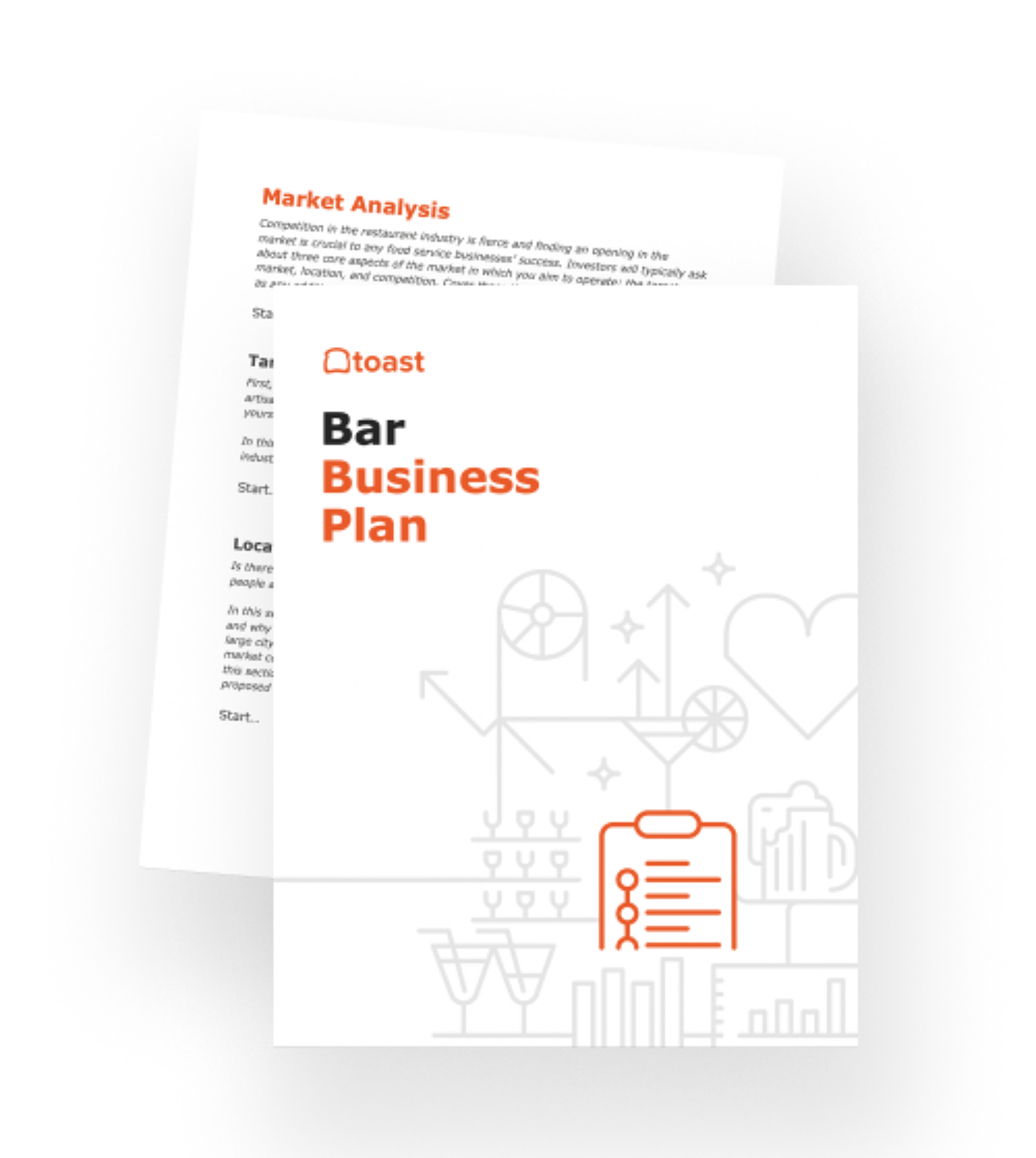
How to Write Your Bar’s Operations Plan
Attract the right investors with your business story with this guide to writing your bar’s operations plan.
Tyler MartinezAuthor


Bar Business Plan Template
Use this free bar business plan template to easily create a great business plan that organizes your vision and helps you start, grow, or raise funding for your bar.
Get free downloadMost bar owners know how important the day-to-day routine is. Without consistent operations, restaurants can quickly lose footing (and some of their already-slim profit margins). Therefore, the operations section of your bar's business plan proves to investors that you know how to run a business.
The operations plan is also a guidebook to your bar's success. Whenever you or your management team has questions about how to do something, you’ll consult the operations plan. It’s worthwhile to spend the time necessary to get this part of the business plan just right.
At the end of the day, your bar is more than a collection of equipment, tables, and recipes. Every restaurant has a story - this is a chance to write your own.
Let’s dive into all the details you need in your bar operations plan to attract the right investors and lead you to success.
Restaurant Business Plan Template
No matter where you’re at in your restaurant ownership journey, a business plan will be your north star. Organize your vision and ensure that nothing is overlooked with this free template.

What are your hours and days of operation?
It might seem like a simple decision. But, when you’ll be open is a major factor in the operations plan. Do market research on when the demand for your product is likely to be highest in your area. Then, make sure you’re open in a generous window around peak business hours.
Remember - staying open for too long can eat into profits. Many bars find it prudent to close on certain days of the week or during certain hours. For instance, many restaurants will not seat customers between 2 and 5 pm. That way, they don’t have to pay staff while they have an empty restaurant.
Who is opening and closing the bar?
Beyond labor costs, the staff responsible for opening and closing the bar are tasked with security, daily maintenance, and other critical aspects of operations. Identify who will be the first in and last out of the bar every day. And, make sure they are staff members you trust.
If you’re planning to hire management staff for those roles, detail how you will find and train trustworthy employees loyal to the business. After all, the bar can’t make sales if it’s not open on time.
Security should never be an afterthought. In the operations plan, detail the steps management will take to secure the assets in the bar. Also, make plans for how any cash that comes into the bar will be stored and eventually deposited.
What is the prelaunch timeline? What needs to be done?
The lead-up to opening is a crucial timeline for a bar. There is staff to train and permits to secure, and it all has to happen before your bar makes any sales. This section of the operations plans layout concrete steps for getting your restaurant open on schedule. Remember that the budget is a key factor in the timeline.
Some common prelaunch checklist items include:
Hiring and training staff
Setting up a point-of-sale
Creating a website and social media presence
Marketing the bar
Decorating the front-of-house
Stocking and equipping the kitchen
Finalizing all the necessary permits
Make a timeline with each step and show potential investors that you’ve worked out the finances needed to get up and running. Be precise in your calculations to show them how their investment will support your bar's success.
Who are the outside consultants that will help with operations?
If you’re new to bar ownership, investors will want to know where you learned your business skills. Show them that you’re invested in your bar's success by writing about where you acquired your entrepreneurial spirit. Don’t forget to include how you plan to continue to grow your skill and potential.
Restaurateurs sometimes hire outside consultants to fill all the roles they don’t have the time or expertise to fulfill. Maybe you’re an innovative young chef who can build profitable winning menus but doesn’t know much about marketing or sales. Or, perhaps you have considerable business prowess but lack a creative vision. In your operations plan, write about how you will make up for those gaps in your skill set.
When it comes to financial consulting, many bars hire an accountant. Some also need bankers and lawyers to oversee the proper execution of investments in their businesses. In the same vein, the food and equipment suppliers you rely on are essential relationships worth careful consideration.
How do business operations improve the business’ profitability?
Operations are essential to a bar's success. If the day-to-day isn’t smooth, all kinds of unexpected costs come up. Having a concrete vision for how every hour of the day should go in your bar- and a plan for every move from prep to service to closing - will ultimately increase your bar's profit potential.
It might be useful to think about your bar as a machine. If the machine is well-maintained, it runs efficiently, saving time and energy. Both time and energy convert into profits in your bar. So, the more efficiently it runs, the more profitable it can be.
Don’t take this machine analogy too literally, though. In other words, don’t make the mistake of dehumanizing your employees. People have bad days and get ill. If you value their unique skills, you’ll understand when they’re not operating at 100%. Factor both profitability and human relations into your bar's operations plan.
Writing Your Bar's Executive Summary
Writing your bar's operations plan requires you to be a bit of a storyteller. Adding color to your bar's executive summary paints a complete and intriguing picture for potential investors of your day-to-day operations.
Here are writing tips to help you make the details of your bar's operations plan an interesting read (really!)
- Always keep the audience in mind. Use some of the vocabulary introduced in this article.
- Find your voice. The operations plan is all about the finer details. Infuse your unique vision into your writing style.
- Keep it simple and clear. It's tempting to throw in lots of clever flourishes when writing, but clarity should be the number one priority.
Feeling confident about your operations plan? With this guide, you can confidently create a plan to rely on. Just remember - your bar is unique. Without efficient operations, your delicious dishes may not make it to the table. So, make sure you give your operations plan the time and attention that you would do your food!
Restaurant Business Plan Template
No matter where you’re at in your restaurant ownership journey, a business plan will be your north star. Organize your vision and ensure that nothing is overlooked with this free template.

Is this article helpful?
DISCLAIMER: This information is provided for general informational purposes only, and publication does not constitute an endorsement. Toast does not warrant the accuracy or completeness of any information, text, graphics, links, or other items contained within this content. Toast does not guarantee you will achieve any specific results if you follow any advice herein. It may be advisable for you to consult with a professional such as a lawyer, accountant, or business advisor for advice specific to your situation.
Read More
Subscribe to On the Line
Sign up to get industry intel, advice, tools, and honest takes from real people tackling their restaurants’ greatest challenges.

